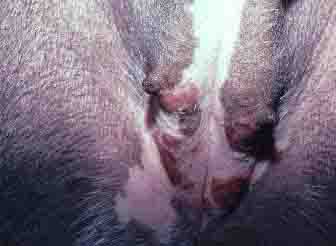Overview
Many pet parents associate dog food allergies with a recent change in diet. The truth is that it can take 2 years before symptoms appear in reaction to one or more ingredients in the food. Allergic reactions are usually to the most common ingredient such as eggs, soy, beef or chicken. Other suspected ingredients are corn, rice, wheat, fish, lamb, poultry or any diary.
Dog Food Allergy

Source: Washington State University
Symptoms
One differentiator between seasonal allergy and food allergy is that the later occurs throughout the year. Symptoms include itch, increased licking, diarrhea, the release of gas and vomiting. Symptoms such as itch are usually cause scratching of the face, feet and ears. Itch is also common in other types of allergy.
Diagnosis
There are two ways to diagnose a dog food allergy. A veterinarian will either recommend an elimination diet or a switch to a hydrolyzed dog food.
Treatment
Elimination Diet
A veterinarian will establish an "elimination diet" for your dog which consists of two ingredients instead of the 40 found in the typical dog good. This would include a protein such as chicken and a carbohydrate such as rice. The diet needs to be followed for 8 to 10 weeks. If the dog starts to improve, then the food allergy diagnosis is confirmed.To be certain, the regular diet is restored to see if symptoms quickly return.
Hydrolyzed Diet
Researchers believe that an allergy to dog food may be caused by problems absorbing proteins. Hydrolyzed dog food uses alters proteins (reduces the weight) in a way that makes them easier to digest. Similar to an elimination diet, if a dog improves, the food allergy diagnosis is confirmed.
References:
Kwochka, KW: Food-Related Dermatoses in Dogs and Cats. 22nd Annual George H. Muller Veterinary Dermatology Seminar in Hawaii, 2006.
Cener for Companion Animal Health U.C. Davis School of Veterinary Medicine
Researched by: Jeff Grill
